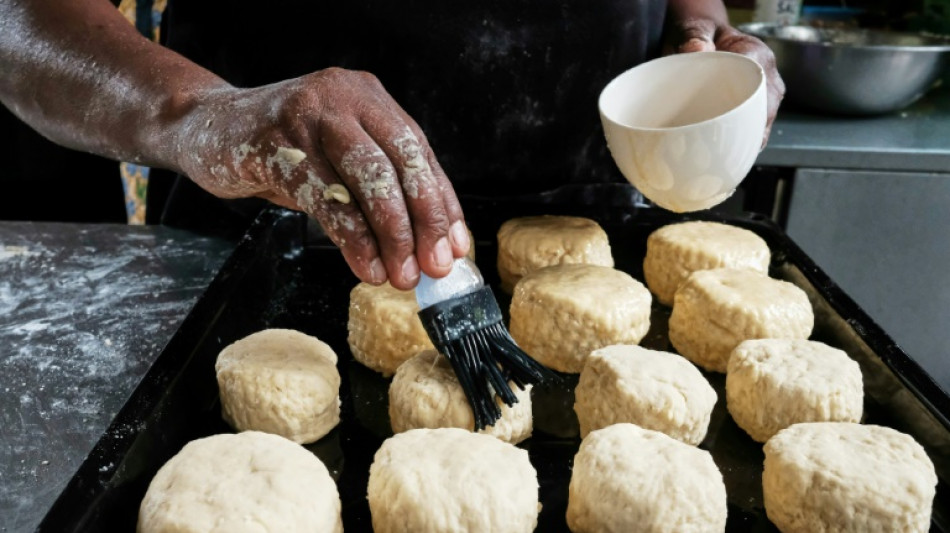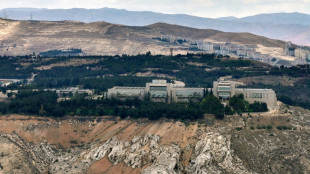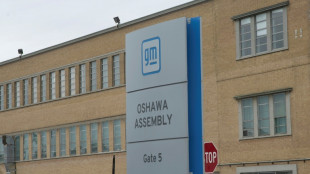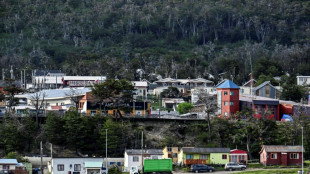
-
 Lives on hold in India's border villages with Pakistan
Lives on hold in India's border villages with Pakistan
-
Musk's dreams for Starbase city in Texas hang on vote

-
 Rockets down Warriors to stay alive in NBA playoffs
Rockets down Warriors to stay alive in NBA playoffs
-
Garcia beaten by Romero in return from doping ban

-
 Inflation, hotel prices curtail Japanese 'Golden Week' travels
Inflation, hotel prices curtail Japanese 'Golden Week' travels
-
Trump's next 100 days: Now comes the hard part

-
 Mexican mega-port confronts Trump's tariff storm
Mexican mega-port confronts Trump's tariff storm
-
Trump's tariffs bite at quiet US ports

-
 Ryu stretches lead at LPGA Black Desert Championship
Ryu stretches lead at LPGA Black Desert Championship
-
Singapore votes with new PM seeking strong mandate amid tariff turmoil

-
 Five things to know about the Australian election
Five things to know about the Australian election
-
Scheffler fires 63 despite long delay to lead CJ Cup Byron Nelson

-
 Israel launches new Syria strikes amid Druze tensions
Israel launches new Syria strikes amid Druze tensions
-
Finke grabs 400m medley victory over world record-holder Marchand

-
 Apple eases App Store rules under court pressure
Apple eases App Store rules under court pressure
-
Polls open in Australian vote swayed by inflation, Trump

-
 Russell clocks second fastest 100m hurdles in history at Miami meeting
Russell clocks second fastest 100m hurdles in history at Miami meeting
-
Germany move against far-right AfD sets off US quarrel

-
 Billionaire-owned Paris FC win promotion and prepare to take on PSG
Billionaire-owned Paris FC win promotion and prepare to take on PSG
-
Teenager Antonelli grabs pole for Miami sprint race

-
 Man City climb to third as De Bruyne sinks Wolves
Man City climb to third as De Bruyne sinks Wolves
-
Mercedes' Wolff backs Hamilton to come good with Ferrari

-
 'Devastated' Prince Harry says no UK return but seeks reconciliation
'Devastated' Prince Harry says no UK return but seeks reconciliation
-
Elway agent death likely accidental: report

-
 Turkish Cypriots protest new rule allowing hijab in school
Turkish Cypriots protest new rule allowing hijab in school
-
Germany's AfD dealt blow with right-wing extremist label

-
 Trump NASA budget prioritizes Moon, Mars missions over research
Trump NASA budget prioritizes Moon, Mars missions over research
-
Hard-right romps through UK polls slapping aside main parties

-
 Rangers hire two-time NHL champion Sullivan as coach
Rangers hire two-time NHL champion Sullivan as coach
-
Haaland on bench for Man City as striker returns ahead of schedule

-
 US designates two Haitian gangs as terror groups
US designates two Haitian gangs as terror groups
-
Lower profits at US oil giants amid fall in crude prices

-
 NBA icon Popovich stepping down as Spurs coach after 29 seasons
NBA icon Popovich stepping down as Spurs coach after 29 seasons
-
'Devastated' Prince Harry says no return to UK but seeks royal reconciliation

-
 Grande scratched from Kentucky Derby
Grande scratched from Kentucky Derby
-
Carney vows to transform Canada economy to withstand Trump

-
 Prince Harry says he would 'love' to reconcile with family
Prince Harry says he would 'love' to reconcile with family
-
Major offshore quake causes tsunami scare in Chile, Argentina

-
 GM cuts shift at Canada plant over 'evolving trade environment'
GM cuts shift at Canada plant over 'evolving trade environment'
-
F1 extends deal to keep Miami GP until 2041

-
 Popovich mixed toughness and spirit to make NBA history
Popovich mixed toughness and spirit to make NBA history
-
US asks judge to break up Google's ad tech business

-
 Trump eyes huge 'woke' cuts in budget blueprint
Trump eyes huge 'woke' cuts in budget blueprint
-
Ruud downs Cerundolo to book spot in Madrid Open final

-
 Gregg Popovich stepping down as San Antonio Spurs coach after 29 seasons: team
Gregg Popovich stepping down as San Antonio Spurs coach after 29 seasons: team
-
Guardiola to take break from football when he leaves Man City

-
 Vine escapes to Tour of Romandie 3rd stage win as Baudin keeps lead
Vine escapes to Tour of Romandie 3rd stage win as Baudin keeps lead
-
Olympic 100m medalist Kerley arrested, out of Miami Grand Slam meet

-
 Chile, Argentina order evacuations over post-quake tsunami threat
Chile, Argentina order evacuations over post-quake tsunami threat
-
Arteta 'pain' as Arsenal fall short in Premier League title race


Across Zimbabwe, British scones are the taste of home
A sweet doughy treat from Britain has become a beloved part of Zimbabwe's national cuisine, where despite the country's colonial past, mothers and chefs alike now claim the pastry as their own.
The scone, which Brits normally enjoy with afternoon tea, is ubiquitous in Harare, the southern African country's capital.
A breakfast favourite in these parts, it can be found everywhere from high-end eateries to the market stalls of impoverished townships.
"We love scones. They are not British, they are ours, our local scones," Nyari Mashayamombe, a rights activist, says as she leaves an upmarket restaurant in Harare's Belgravia district, its garden dotted with open umbrellas.
Dense yet airy, Zimbabwean scones are the result of the intercultural mix that came with colonisation, says Mashayamombe, a red-haired 42-year-old who is also a singer and media personality.
In "fancy places like here... a beautiful scone goes as high as six bucks," she said, referring to the American dollars that have become Zimbabwe's parallel and preferred currency.
"It's worth it."
A few kilometres away at a market in Harare's oldest township of Mbare, scones are impossible to find after midday.
"We sold them all this morning. They move quickly," one vendor says.
- Yeast and buttermilk -
The main communal bakery in Mbare, a bustling working-class district, opens at dawn.
Tawanda Mutyakureva, 26, arrives at around five in the morning to his work station, measuring two square metres, where he has to bend over to spread the dough on a knee-height countertop.
Every day he cranks out around 200 scones in an overheated room with cinder-block walls, lit by two bulbs hanging from a wire.
Brandishing a cookie cutter, he works quickly to whip out one batch after another, with each scone selling for 25 American cents.
In the hot, humid atmosphere redolent of yeast, his wife -- with their baby strapped to her back -- helps him with buttering the pastries and clearing plates.
Resellers come in to buy 10 or 20 pieces that will be sold at small grocery stores.
Memory Mutero, 46, was at the bakery to buy bread, since she makes her own scones at home.
"I make scones for my three kids. It takes about 45 minutes," she tells AFP.
Her ingredients are simple: flour, salt, yeast, sugar, butter and milk.
But at the Bottom Drawer, an upscale tearoom in Harare, cook Veronica Makonese is unimpressed after tasting a scone brought back from the township.
"There is no milk in those, they used water!" the 46-year-old claims.
A white kerchief on her head, Makonese says she makes her own buttermilk for her scones, to control temperature and acidity levels, and uses only real butter to ensure the proper taste and softness.
Her boss, Sarah Macmillan, a 53-year-old Zimbabwean, says she longs for the scones she would eat as a child.
Back then, two shops in the centre of Harare, now closed, competed for the crown of best scone in the country, and Macmillan wanted her tearoom to make some that are "just as good".
Macmillan says the secret of the little cake's enduring success, in a country struggling with endemic poverty, is simple: "It's very filling and affordable."
P.Costa--AMWN